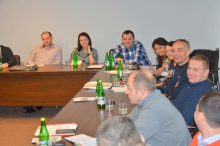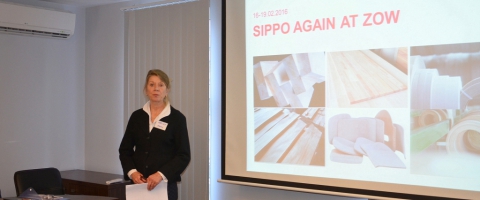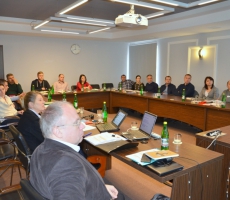
Wood processing companies gear up for ZOW 2016
On December 1-2, 2015 in Lviv, Swiss Import Promotion Program SIPPO (Switzerland) and Agency FORZA – SIPPO partner in Ukraine – organized the workshop-training for wood processing companies that are interested in participating with SIPPO support in the leading fair of furniture components ZOW that will take place on February 16-19 in Bad-Salzuflen (Germany).
This year the two-day training focused on “Sales strategies for wood processing companies and innovations.” 23 participants represented companies like: Agroderew (furniture panel), Riton (lamella), Gelika (bent furniture elements from plywood), Ukrainska lisopererobna kompanija (parquet), Eskada-M (veneered furniture panel), Holz (sawn timber), Uniplyt (fiberboard), Krokwood (finger-jointed panels), Eurostandard (parquet), Mebli-Styl (upholstered furniture), Ecocomplekt (furniture panel). All companies have one feature in common: they are ready to export, but need additional knowledge.
The trainees learned about peculiarities of negotiations and client meetings. This was in detail presented by the trainer Vasyl Masyuk. NGO FORZA Coordinator Radmila Ustych highlighted results of the fairs Ukrainian companies participated in as part of the SIPPO collective stand. At Interzum 2013, nine companies within the SIPPO collective stand made Euro 3,4 mio sales after only six months. At the next ZOW 2014 fair, six companies made Euro 1.95 mio sales. At INTERZUM 2015 ten companies made a whopping EUR 5.34 mio! We hope that next ZOW 2016 fair will also be successful for the SIPPO-supported companies.
Expert on wooden house construction from Switzerland Christoph Haering on the example on his own projects demonstrated what can be built in wood – whether a bridge for trucks, a temple in Bhutan or a four-storey building in town – wood does it all, provided you know the right technologies and you anticipate the trends. The workshop dealt with another trend: going digital in the wood market (speaker Sabine Hahn-Fornet, SIPPO Manager Technical Wood Program).
“The window to Europe” from SIPPO
The Swiss Import Promotion Programme SIPPO of Switzerland-Global Enterprise supports private small- and medium-sized enterprises from countries in transition that endeavour to access the Swiss and the EU markets, including via participation in leading European trade fairs. The SIPPO offer includes:
- 8-10 m2 booth surface in a central head stand open on three sides
- Stand design and construction
- Stand facilities (office, kitchen)
- Restaurant lunch and all-day catering
- Advertisement before the fair (catalogue in print and online, personal invitation to more than 1.000 Swiss and EU importers, listing in the official ZOW trade fair exhibitor list)
- Coaching & support by SIPPO and selected experts
- Match-making by SIPPO
- Accommodation ( 6 nights) for two representatives of your company
- Workshop with sales training
- After-fair follow-up by SIPPO and selected experts.
More than 2000 companies over last 5 years have benefitted from SIPPO support.
In Ukraine, through collaboration between SIPPO and NGO FORZA, 16 wood processing and furniture companies took advantage of SIPPO support and participated in 11 leading European trade fairs (Wooden Toys 2007, 2008; Hausbau & Energie 2010; Swissbau 2009,2012; IMM 2011; Interzum 2011, 2013; Domotex 2014; ZOW 2014; Interzum 2015).
Ukrainian candidate companies should comply with the following criteria: be a producer of technical timber products (flooring, molding, furniture panels, doors, stairs, veneer, plywood, furniture components etc.), be a 100% Ukrainian ownership, small or middle-sized, with at least one English speaking person.
In ZOW 2016 there will be four Ukrainian participants, two of them will participate in the international trade fair for the first time, therefore practical hints on how to get the most from the fair were very welcomed.
Right marketing is the key for success
The training organized by NGO FORZA was aimed to prepare the companies to the trade fair. Three types of marketing according to which products are promoted, raise the chances for the successful sale of your product. Let’s have a brief look at them.
- arketing 1.0 is all about the product. If the product serves it functions then it sold (like if the client needs a chair and he does not an arm-chair). This approach was the case in the last century, although it is still goof for some categories of goods.
Marketing 2.0 is client-centered. In contrast to product features, it is all about product advantages. For instance, a nicer design of otherwise identical doors will be an advantage, and such doors will sell better. By using this type of marketing the companies become the drivers of demand.
Marketing 3.0 is individual-centered. It breaks the established patterns of product consumption. With excess of money, people stop chasing after products, their consumption becoming very selective. So fashion for furniture or other products does not affect those customers. They think in terms of benefit (for example, why should I by a representative class car if it is easier to park a smaller car?), rather than of advantage. Some desire to assume their fair share of social responsibility for issues that concern everyone (e.g. environment, human rights, gender equality, poverty etc.).The new stage of marketing begins, when a client says: “I want to show my individuality”.
Communication is the bottom line
To make a client buy your product, it is important to know how exactly people make decisions about purchase. At the trade fair you will come across people who either feel the need in your product, or are evaluating different options, or choose between two products or doubt whether they should buy exactly this product.
Consequently, sales techniques utilized with different types of customers differ. There are operational sales, when you are approached by a client who has already chosen a product, has no doubt about it, and the only thing that the seller, that is you, can make is to rattle this piece of business through.
Second type of sales technique is more complicated. This is called consultation sales – when you give to your client advisory services, talk through the product, help dispel arising doubts and convince him to make a purchase. Client’s doubts not necessarily are associated with the product, but with, e.g. with the situation in the country, Therefore, maximum sincerity of the seller and responsiveness to customer’s needs is vital, since at this stage of decision making the client is very sensitive.
Such advisory sales are quite common. But there is still another type of sales – partnership sales – when buyer and seller jointly produce strategy and plans, identify vulnerabilities and opportunities for future cooperation, and establish partnerships.
Prepare well ahead
To make sure your participation in the fair is fruitful, start communicating with potential clients before the fair. Check the trade fair website, specialized portals, and social media.
Next, prepare promo materials and samples. One additional benefit of the training was the analysis of promotional materials participants brought with them. A long list of technical characteristics of the product and production equipment in disposal - is not what client wishes to see. Most of clients are interested: “What is the benefit of the product for me?”, “How this product is going to solve my problem?”. Sales are ensured by the skills to turn the product feature into the client benefit.
That is why when selecting company staff to work at the stand, make sure to select the ones who not only know the product, but are also open, communicative and get on with people and understand their needs, and consequently – to offer the product with the focus on either its feature or its benefit, since this is the basis for follow up steps with a client.
For an efficient further communication the staff should know products and services the company offers, prices and conditions of shipment, competitors and their conditions of shipment, target clients, most important clients and stakeholders. It is important to make notes about the conversation with a client. Daily analysis of work on the fair is preferred: some thinks may need to be clarified or done while you are still there.
Participants also learned that “after the fair” stage is as important and as laborious as the “before” and “during”. You need to sort and process all contacts you’ve made at the fair, assess efficiency of your participation and draft next steps in dealing with potential partners. Sending out a thank you letter for visiting the stand is a very first step in the process of building relationship with your potential client.
Participants of the training were able to critically assess how fit they are for the fair and identify what still needs to be done before ZOW and what to coordinate with SIPPO. Wishing best of luck to our participants at ZOW 2016!
Pictures from the training: https://onedrive.live.com/redir?resid=B740DCF5F52B9E64!122&authkey=!AAOfSkpUweLI6qM&ithint=folder%2cini
Presentations from the training:
[slideshare id=58052856&doc=sippoagainatzow-160209134704]






